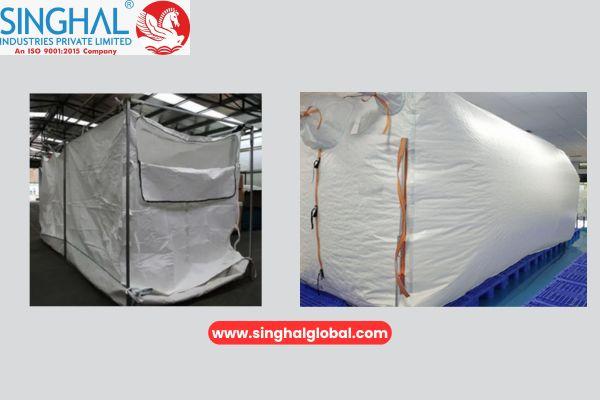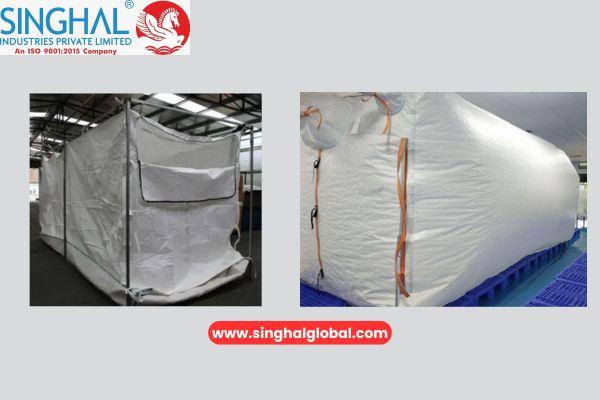Bulk Container Liners: A Comprehensive Solution for Bulk Material Transportation

In today's fast-paced global trade environment, efficient and secure transportation of bulk materials is crucial for businesses across various industries. One of the most innovative and cost-effective solutions for this challenge is the use of Bulk Container Liners. These liners offer significant advantages when transporting dry bulk materials, ensuring that goods arrive in optimal condition while maximizing space and reducing handling costs.

What Are Bulk Container Liners?
Bulk Container Liners are flexible plastic liners designed to fit inside standard shipping containers, transforming them into efficient bulk transport systems. These liners are commonly used to ship dry bulk materials such as chemicals, grains, food products, and minerals. They act as an additional protective layer, ensuring that the bulk materials do not come into direct contact with the walls of the container, thus preventing contamination or loss of product.
Manufactured from durable and high-quality polyethylene or polypropylene, Bulk Container Liners are resistant to punctures and tears, providing excellent protection against moisture, contaminants, and temperature changes. With their ability to safeguard materials during transit, these liners have become indispensable in industries that require bulk transportation.
Flexible Container Liners: Adaptable for Various Materials
One of the key features of Flexible Container Liners is their adaptability to different types of bulk materials. Whether you're shipping grains, powders, or even granular materials, these liners can be tailored to fit the specific requirements of your cargo.
Flexible Container Liners are available in different configurations, including single-layer and multi-layer designs, depending on the nature of the material being transported. Some liners are equipped with filling and discharge spouts, which make loading and unloading materials easy and efficient, reducing labor and time. Their flexible nature allows them to accommodate a wide range of container sizes, making them suitable for small shipments as well as large-scale operations.
Benefits of Using Container Liners for Bulk Materials
The use of Container Liners for Bulk Materials offers numerous advantages to companies involved in the shipping of bulk goods:
- Cost-Effective: Using container liners is significantly cheaper than other bulk transportation methods, such as bulk vessels or specialized bulk trucks. Companies can use standard containers with liners, minimizing the need for expensive specialized equipment.
- Reduced Risk of Contamination: By creating a barrier between the container and the cargo, Container Liners for Bulk Materials prevent contamination from dust, dirt, or residue left from previous cargoes. This ensures the cleanliness and safety of the transported materials.
- Increased Storage Efficiency: Liners allow for the optimal use of container space, enabling businesses to transport a larger volume of materials in a single shipment. This increases operational efficiency, saving time and resources.
- Ease of Loading and Unloading: Flexible Container Liners come with features such as fill and discharge spouts, which streamline the handling process. These spouts minimize material spillage, reduce waste, and cut down on labor costs.
- Environmentally Friendly: Many Bulk Container Liners are made from recyclable materials, making them an eco-friendly choice for companies looking to reduce their environmental footprint.
Applications of Bulk Container Liners
Bulk Container Liners have a wide range of applications across various industries. They are commonly used for transporting agricultural products like grains, rice, and seeds, as well as industrial materials such as chemicals, resins, and minerals. These liners are also popular in the food and beverage industry for shipping products like sugar, flour, and malt.
In the chemical industry, Flexible Container Liners offer a reliable solution for transporting hazardous and non-hazardous dry chemicals. Their leak-proof design ensures that the material remains contained throughout the journey, reducing the risk of accidents and contamination.
Conclusion
As global trade continues to grow, the demand for safe, efficient, and cost-effective transportation of bulk materials has never been higher. Bulk Container Liners provide a versatile and practical solution for businesses seeking to optimize their supply chains. With their ability to protect cargo, minimize waste, and reduce transportation costs, these liners are essential for companies involved in the movement of dry bulk materials.
Whether you're looking to transport agricultural goods, chemicals, or industrial materials, Flexible Container Liners offer the flexibility, protection, and efficiency needed to meet the demands of modern shipping operations. Investing in high-quality Container Liners for Bulk Materials is a smart choice that can help your business stay competitive in the global marketplace.
FAQs on Bulk Container Liners
1. What are Bulk Container Liners?
Bulk Container Liners are large, flexible liners made from materials like polyethylene or polypropylene, designed to fit inside standard shipping containers. They are used to safely transport bulk dry materials such as grains, chemicals, and minerals.
2. What types of materials can be transported using Container Liners?
Bulk Container Liners are ideal for dry bulk materials like grains, powders, resins, chemicals, sugar, flour, seeds, and minerals. They are also used in industries such as agriculture, food and beverage, and chemicals.
3. How do Flexible Container Liners work?
Flexible Container Liners are inserted into a shipping container to create a protective barrier between the cargo and the container walls. This prevents contamination, moisture, and other environmental hazards from affecting the materials during transport.
4. What are the benefits of using Container Liners for Bulk Materials?
Using Container Liners improves space efficiency, reduces contamination risks, lowers transportation costs, and simplifies the loading and unloading process. Additionally, many liners are recyclable, making them an environmentally friendly option.
- Questions and Answers
- Opinion
- Motivational and Inspiring Story
- Technology
- Live and Let live
- Focus
- Geopolitics
- Military-Arms/Equipment
- Güvenlik
- Economy
- Beasts of Nations
- Machine Tools-The “Mother Industry”
- Art
- Causes
- Crafts
- Dance
- Drinks
- Film/Movie
- Fitness
- Food
- Oyunlar
- Gardening
- Health
- Home
- Literature
- Music
- Networking
- Other
- Party
- Religion
- Shopping
- Sports
- Theater
- Health and Wellness
- News
- Culture

